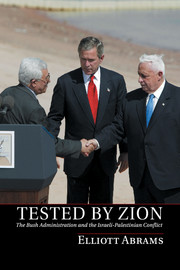Book contents
- Frontmatter
- Contents
- Acknowledgments
- Introduction
- 1 Early Days
- 2 9/11 and the Search for a Policy
- 3 Roadmap to Disengagement
- 4 “New Realities on the Ground”
- 5 Arafat, Disengagement, Sharon
- 6 Olmert – Peace or War?
- 7 War in Lebanon – and Condi
- 8 From Mecca to Annapolis
- 9 The “Meeting” at Annapolis
- 10 Two Trips to Jerusalem
- 11 Final Days in Gaza and Turtle Bay
- 12 Lessons Learned
- 13 Conclusion
- Index
- References
10 - Two Trips to Jerusalem
Published online by Cambridge University Press: 05 January 2013
- Frontmatter
- Contents
- Acknowledgments
- Introduction
- 1 Early Days
- 2 9/11 and the Search for a Policy
- 3 Roadmap to Disengagement
- 4 “New Realities on the Ground”
- 5 Arafat, Disengagement, Sharon
- 6 Olmert – Peace or War?
- 7 War in Lebanon – and Condi
- 8 From Mecca to Annapolis
- 9 The “Meeting” at Annapolis
- 10 Two Trips to Jerusalem
- 11 Final Days in Gaza and Turtle Bay
- 12 Lessons Learned
- 13 Conclusion
- Index
- References
Summary
The president's January trip took us to Jerusalem and then Kuwait, Bahrain, Abu Dhabi, and finally Saudi Arabia; we were on the road for more than a week. We began in Israel with a visit to President Shimon Peres, and President Bush clearly had a message on his mind. The squabbling and lack of progress since Annapolis made him wonder if he was wasting his time on the Middle East “peace process” during his precious final year in office. He told Peres it was not at all clear that Israel was ready to make the tough choices that peace would require. His purpose in talking to Israeli leaders, he said, was to determine if they were serious; if a deal is not possible, I have other things to do.
“We Survive Here Not Because We Can Quote Isaiah but Because We Have a Gun”
That same day, January 9, President Bush met with Olmert, Foreign Minister Livni, and Defense Minister Barak. First there was a thorough discussion of the refugee issue, with Livni making a forceful presentation. The president asked her if any “refugees” would be let into Israel or was her number really zero. Zero, she replied. Our goal is to end the conflict through the creation of a Palestinian state, a Palestinian homeland. Israel absorbed Jews from Europe and the Arab states; that was the raison d’être of Israel. Two states for two peoples – the creation of a Palestinian state is the solution for the Palestinians. People ask “Why not take some?,” she continued. I’ll explain why: To say yes means this conflict remains open for the future. First, how would we ever choose who comes back? The argument about which ones get to come to Israel would never end. And the delegitimization of Israel would continue. To give up part of our land, to divide the land between two peoples, provides an answer to their national aspirations. They cannot establish a Palestinian state and then say some should come to Israel. This affects the legitimacy of Israel. We cannot stop the process of their dreaming about replacing Israel unless we just stop any discussion of Palestinians coming here in the future.
- Type
- Chapter
- Information
- Tested by ZionThe Bush Administration and the Israeli-Palestinian Conflict, pp. 262 - 281Publisher: Cambridge University PressPrint publication year: 2013



